
Thread #4 Quatre: The Adventure of Arabs
Based off my notes of my favorite book of the year; just wanted to share my notes and a preview of a great read and 3000 years of a fascinating culture and civilization.
amazon.com/Arabs-000-Year…
Based off my notes of my favorite book of the year; just wanted to share my notes and a preview of a great read and 3000 years of a fascinating culture and civilization.
amazon.com/Arabs-000-Year…
Let's set the stage: In this map, you'll find our journeys & destinations. "Arabs" are an amalgamation of several groups of ppl who coalesced into one. Initially, they were the "other" by settled folk, but these tribal and nomadic "other" would soon define the settlers themselves 

In 853 BCE, Assyrian King Shalmaneser III declares victory over a Levantine coalition aided by "Aribi." This is where the word and identity is first attested.
Tribal and savage nomads from the desert wastelands, their mentioning becomes more frequent among settled Mesopotamians.
Tribal and savage nomads from the desert wastelands, their mentioning becomes more frequent among settled Mesopotamians.
They are mentioned as having tribes and names based off animals:
Waki' (Strong Horse) was the progeny of Kalb (dog) son of Asad (Lion), etc
These "Aribi" were famed for their use of camels and the dimension they added in military conflict. Nuisances & mercenaries alike.
Waki' (Strong Horse) was the progeny of Kalb (dog) son of Asad (Lion), etc
These "Aribi" were famed for their use of camels and the dimension they added in military conflict. Nuisances & mercenaries alike.
The Etymology of "Arab" is contested but it seems for both the Assyrians & South Arabians (who did NOT consider themselves "Arab" early on) both refer to these "arabs" as desert-dwelling nomads, their defining feature; many times pejoratively.
These nomads would win in the end.
These nomads would win in the end.

The nomads loved their oral poetry and evolving language. Great seers (Kahins) would create mesmerizing poetry that even won the hearts of settled neighbors and foreigners. This oral catalog would coalesce into a "High Arabic" with time and practice. The basis of "Arab" identity.
An interesting parallel is the "Aryans" of India:
-Rig Vedic era featured mobile/half settled tribes warring with each other.
-Rishis sung/heard the great Vedas; this solely oral poetry became the roots of Indian thought & civilization
-Sanskrit being a "divine language"
-Rig Vedic era featured mobile/half settled tribes warring with each other.
-Rishis sung/heard the great Vedas; this solely oral poetry became the roots of Indian thought & civilization
-Sanskrit being a "divine language"
A few interesting groups (but not all) who eventually coalesced into Arabs:
-The Nabateans
-The South Arabians
-The Bedouins
-The Nabateans
-The South Arabians
-The Bedouins
Nabateans: The famed builders of Petra & extremely cosmopolitan folk who inhabited northern Arabia and the southern Levant. They incubated the precursor to Arabic script & later aided in formalizing Arabic. Influences from the Persians & Levantine would be pivotal in the future. 
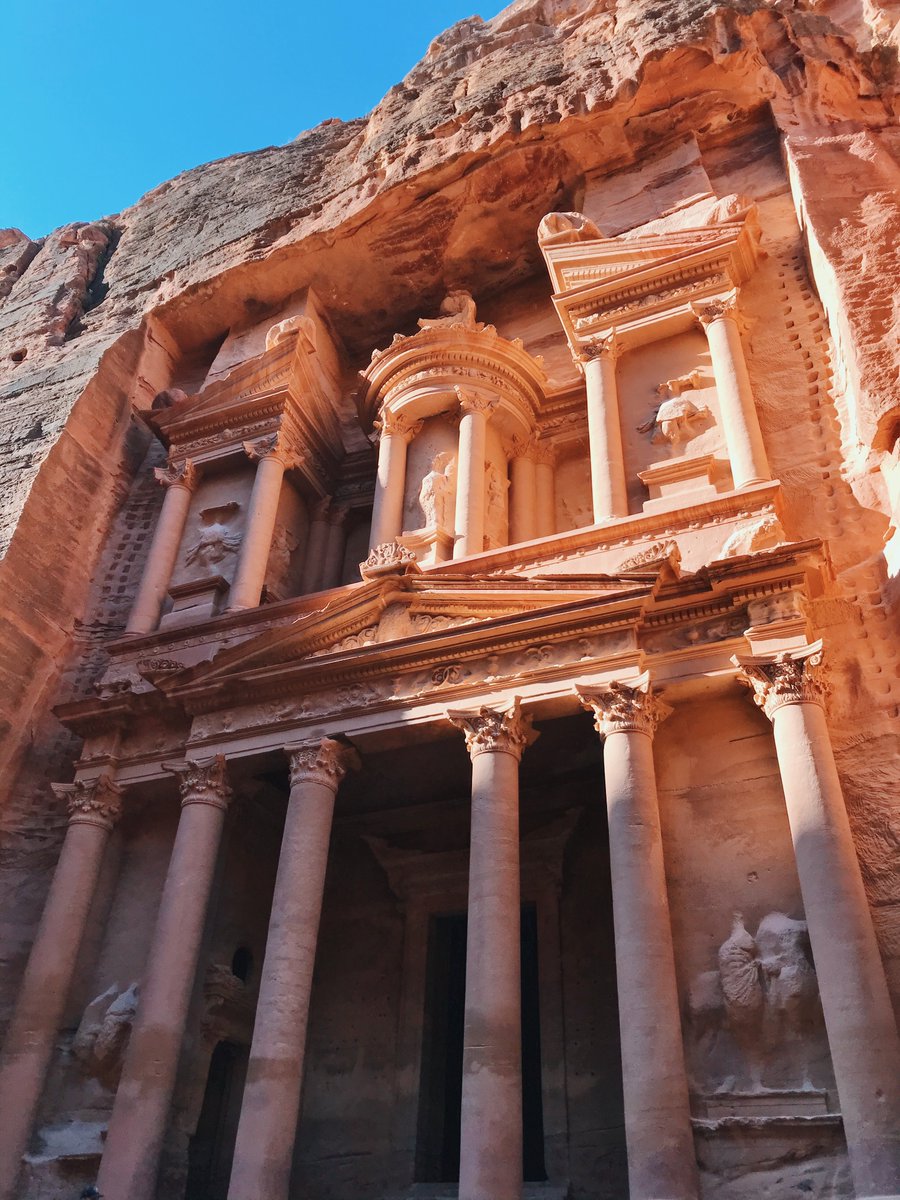
South Arabians – Non-Arabic speaking Sabaeans & Himyaris of Yemen were a settled civilization of Arabia. Their expertise in commerce/engineering would provide cities that gave many of the foundations and myths of Arab culture (al-Rahman=supreme god, Marib dam break myth...) 
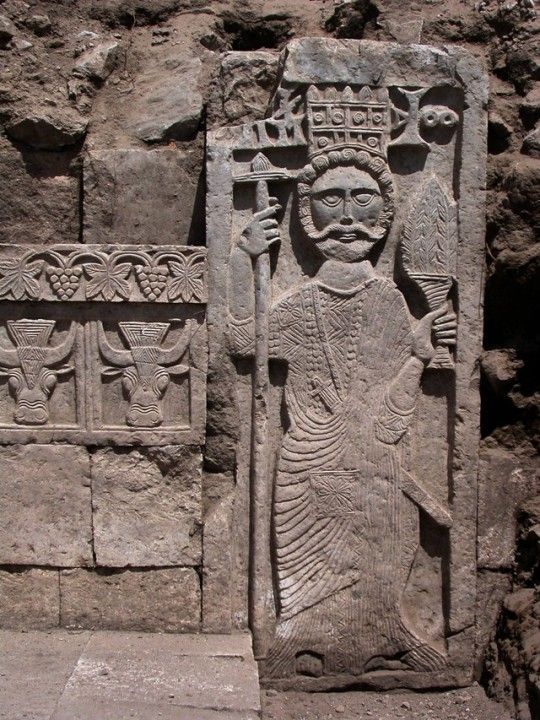
Bedouins: the classic image of Arabs finds a home in the nomads of the desert. Initially looked down upon by their settled cousins, it would be the Bedouin ways that won in the end with their Arabic dominating tongues, swords ruling cities, & their God’s message conquering minds. 
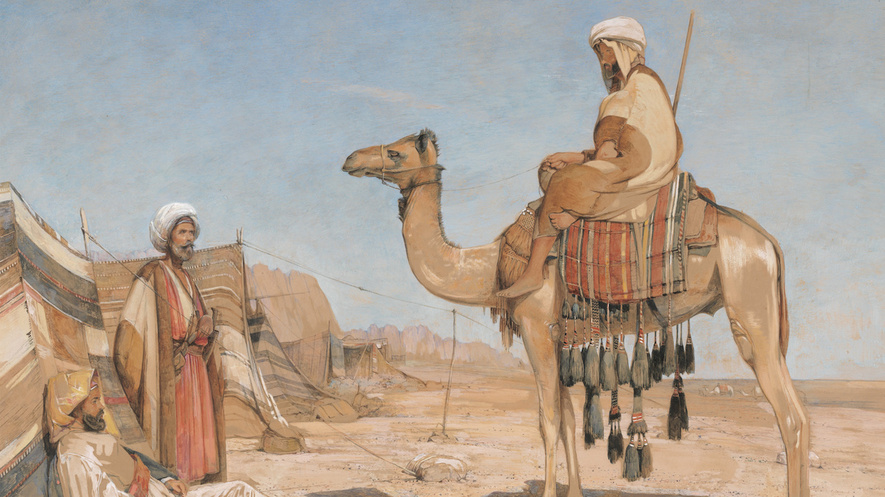
A theme that dominates Tim's book & Arab history is the conflict between Hadr (settled life) & Badw (nomadic life).
The emphasis on Badw is an esp defining feature of Arab culture, both good & bad.
"Civilizations always collapse when Bedouins (Arabs) take over."
-Ibn Khaldun
The emphasis on Badw is an esp defining feature of Arab culture, both good & bad.
"Civilizations always collapse when Bedouins (Arabs) take over."
-Ibn Khaldun
The old history of Arabs is cloudy. It's a collection of poetry and myth. Much of which provides a backdrop for the Quran. But it is poetry that dominates Arab history.
"Poetry, as Adonis has written, is where the Arabic mind is free from ideology"
"Poetry, as Adonis has written, is where the Arabic mind is free from ideology"
A line of poetry is like a building: its basis is natural talent, its roof is the ability to transmit poetry from earlier poets, its pillars are knowledge, its door is practice, it’s inhabitant is meaning. A house that is uninhabited is no good.
-Ibn Rashiq
-Ibn Rashiq
Writing, while coming later did feature in early Arab history. The magnetic curve of Naskh script was preceded by much more crude carvings on desert rocks. See @Safaitic 's brilliant thread
twitter.com/i/events/10480…
twitter.com/i/events/10480…
Kufic script is seen as a polygon parallel or prior to Naskh (the common Arabic script you see today) as a modified form of our Nabatean friends' old etchings. The cosmopolitan north would give imagery to the southern Bedouin voice. 

Now as discussed earlier, the Arabs were disparate groups and tribes. Locked in a cycle of raiding and trading with each other. These are the prequel days of Islam and Arabiyyah.
Imru al-Qays would feature as a forerunner to the most famous of Arabs, Muhammed...
Imru al-Qays would feature as a forerunner to the most famous of Arabs, Muhammed...
As Imru rose to became a famed poet and fighter, coming oh so close to uniting the Arab tribes but failing once again oh so short in these old times of perpetual tribal warfare and disunity, known as the "Days of the Arabs."
Arabs thought this was their natural state.
Until...
Arabs thought this was their natural state.
Until...
You already know where I'm going with this, but a quick geopolitical background before we watch as the Arabs consolidate and explode out the peninsula
The Byzantines & Sassanids were finishing a brutal 20+ year war. Exhausted, they retired the services of the quasi-Arab Lakhmids and Ghassanids. The Ghas took it okay, the Lakh King rebuffed a marital alliance with the Persians. He was trampled to death with elephants by the Shah 
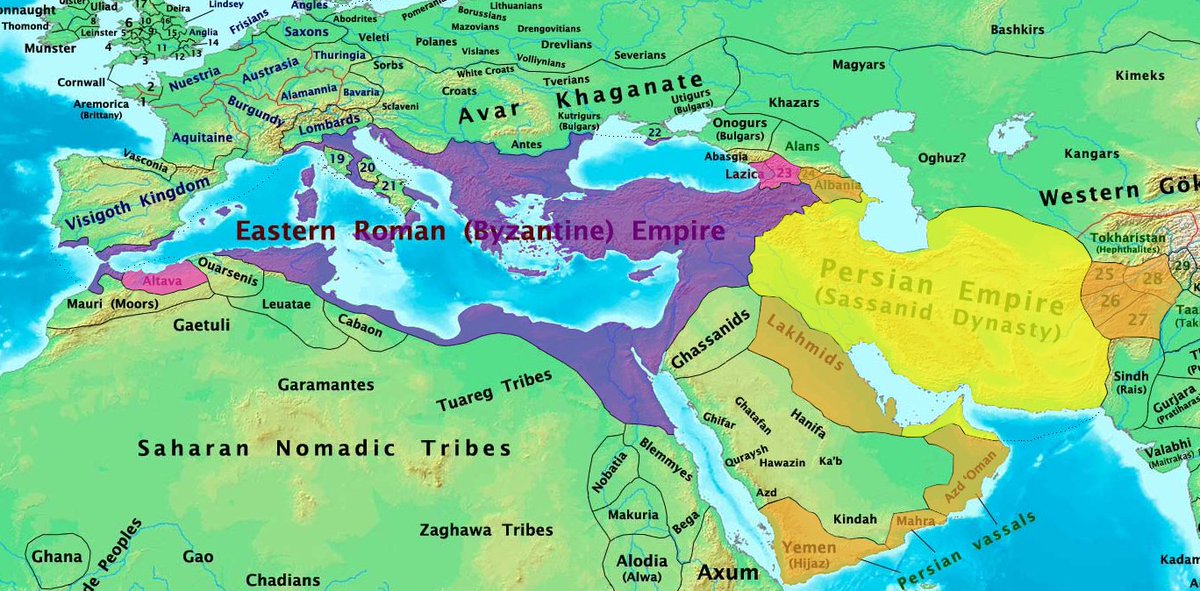
The furious Lakhmids assembled a super raid of Arab tribes and decisively defeated the Persians at Dhu Qar. The first victory of Arabs vs Persians in a long time.
An obscure Meccan merchant apparently said that day, "Today the Arab have demanded vengeance from the Ajam and won."
An obscure Meccan merchant apparently said that day, "Today the Arab have demanded vengeance from the Ajam and won."
This merchant would not be obscure much longer.
Muhammed would finally bring that fabled unity to Arabs through the classic combo of religion + politics.
But Tim's book isn't about the history of Islam. While dedicating big chapters to Muhammed's era, it's not the focus.
Muhammed would finally bring that fabled unity to Arabs through the classic combo of religion + politics.
But Tim's book isn't about the history of Islam. While dedicating big chapters to Muhammed's era, it's not the focus.
The big takeaways of it:
-Islam has intrinsic/profound links to Arab(north & south) paganism & geography
-Spread of Arabic alphabet/literacy was integral to uniting culture and empire admin of Arab tribes
-Integration of Levantine+Persian motifs in theology & governance
-Islam has intrinsic/profound links to Arab(north & south) paganism & geography
-Spread of Arabic alphabet/literacy was integral to uniting culture and empire admin of Arab tribes
-Integration of Levantine+Persian motifs in theology & governance
The South Arabians (Sabaeans) are a particularly interesting contributor as they initially did not speak Arabic, looked down upon Bedouins as uncouth savages, & worshipped a supreme deity named al-Rahman (familiar?).
The settled Sabaeans built a legendary dam, Marib, which broke causing an exodus of the Sabaeans into the deserts of Arabia (this is a building block of the "Yemenis are the original Arabs narrative").
Al-Rahman, Marib, & other motifs find mention in the Quran.👸🏽of Sheba(Saba)⬇️
Al-Rahman, Marib, & other motifs find mention in the Quran.👸🏽of Sheba(Saba)⬇️

Twitter stopped me midway (I hit the limit) but there's much more, I'll continue as needed as well as make an article on the Arabia of Old one day. An amazing yet unexplored period of history.
Anyways, Onward.
Anyways, Onward.
With Muhammed's passing, the conflicts over succession emerged which would define Islam in the coming centuries.
The basics you're probably aware of so I'm not going to get too into this:
Sunni wanted Muhammed's "best" companion Abu Bakr, Shia wanted Mo's fam+best disciple Ali
The basics you're probably aware of so I'm not going to get too into this:
Sunni wanted Muhammed's "best" companion Abu Bakr, Shia wanted Mo's fam+best disciple Ali
But I want to go into the age of Arabia's 2 great empires: The Umayyads and Abbassids.
PS: I thought Aladdin was Indian for most of my childhood (still is for me!)
PS: I thought Aladdin was Indian for most of my childhood (still is for me!)
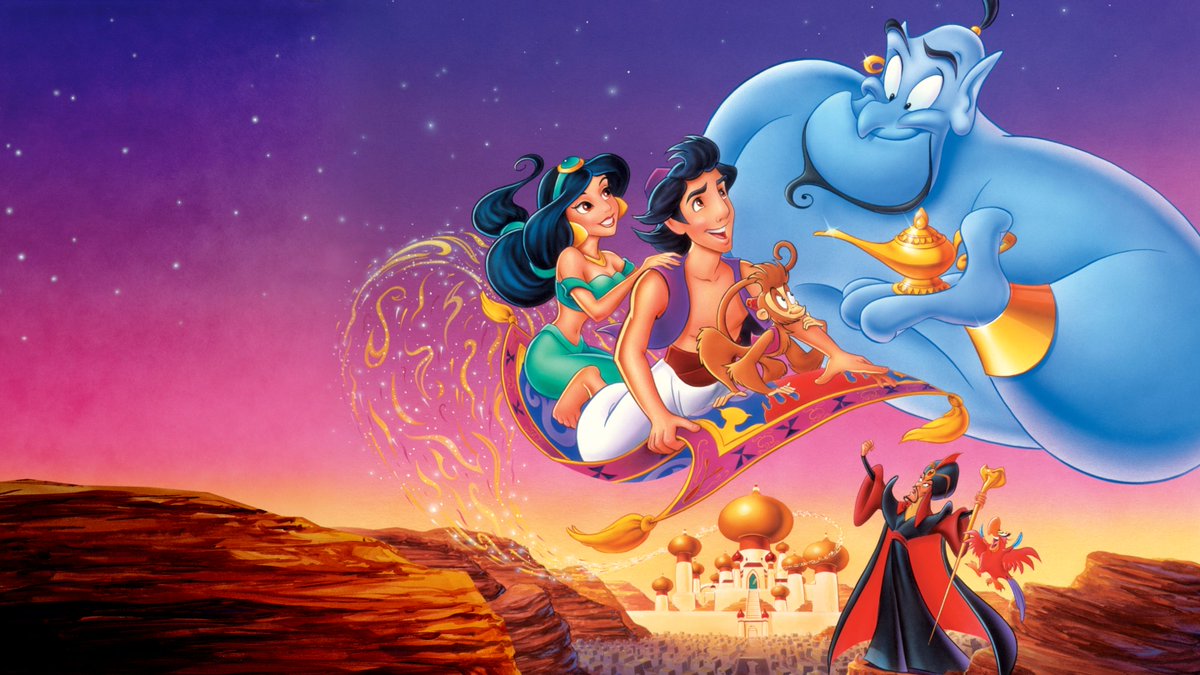
While Islam played a central role, the Umayyads retreated towards the familial dominance of tribal Arab life. They combined camel and horse to a stunning effect, steamrolling Byzantine and Sassanid forces.
A premium was put on "Arabness" rather than Islam when it came to elites.
A premium was put on "Arabness" rather than Islam when it came to elites.

The seeds of split in Islam were further sown in this period as a bloody conflict emerged between later Umayyad rulers and Muhammed's family.
Muhammed's family lost completely in the end, with the annihilation in Karbala fresh on Shia minds till today.
Muhammed's family lost completely in the end, with the annihilation in Karbala fresh on Shia minds till today.

The Abbassids on the other hand were a rebellion formulated in the newly conquered Khorasani lands.
Bactrian camels and black flags swooped into Umayyad heartlands to flip the dynasty to the sons of Abbas. This is where things get more interesting.
Bactrian camels and black flags swooped into Umayyad heartlands to flip the dynasty to the sons of Abbas. This is where things get more interesting.
The Abbasids were more outward-looking, especially east vs the Umayyads who took inspiration from the Levant and Arab roots.
In a way, they were the greatest Arab empire, yet least Arab.
Why? Let us see...
In a way, they were the greatest Arab empire, yet least Arab.
Why? Let us see...
Caliph al-Ma’mun of the Abbasids was a huge patron of philosophy and sciences and had translations of Greek, Persian, and Indian works done extensively.
Integration of this knowledge meant integrated these people do, many of whom would eventually convert.
Integration of this knowledge meant integrated these people do, many of whom would eventually convert.
These new converts (Mawalis - those who required a Mawla or "master" from an Arab tribe to "sponsor" the conversion and social-climbing) would eventually foment resentment towards many of the more "ethnicity emphasizing" Arabs
Arabs would also travel to other regions, to learn and churn knowledge
https://twitter.com/TheEmissaryCo/status/1304135464442572805?s=20
But the dearth of knowledge amongst these new Bedouin overlords meant they had to keep integrating these Mawalis and eventually a large cultural dilution & mixing occurred with Persian culture especially dominating, Greek knowledge reviving, & Indian science transmitting.
While the administration was hollowing out Arabs, the military proved another aspect - the Turks were coming.
Slaves from central asia were captured and sold to become an integral military force amongst Arab regions...who would later upend their masters.
Slaves from central asia were captured and sold to become an integral military force amongst Arab regions...who would later upend their masters.
During this time, a group of non-Arab Muslim intellectuals emerged, the Shu'ubbiyah, attacking Arab ancestry while praising Islam. They were mostly from the eternal Ajam (non-Arab rivals), the newly conquered Persians. 

Converted Tunisian Arab Fatimids would storm Egypt and promote Arabism/Islam through Cairo, Al-Azhar mosque/learning, and forcing migration of unruly Peninuslar Arab Bedouin to the west.
Arabizing and depopulating/attacking Berber lands.
Arabizing and depopulating/attacking Berber lands.

Up north, Buwayids (Caspian converts) and Seljuk Turks who begin to chip away at Abbasid holdings as Turkic uprisings began.
Mongol raids into Baghdad would eventually be the nail in the coffin as the horse beat the camel sending Arabs back into the wilderness for centuries.
Mongol raids into Baghdad would eventually be the nail in the coffin as the horse beat the camel sending Arabs back into the wilderness for centuries.
Arabs would now retreat to trade as it particularly became lucrative in the Indian Ocean, further spreading Arab culture and Islam
https://twitter.com/TheEmissaryCo/status/1312798230204297220?s=20
Arab blood would retain much prestige in the Islamic world, but it was increasingly now becoming the Turkic Islamic world as Turks would found empires from India to Anatolia.
Turkic slave warriors would eventually even flip Egypt as the Mamluks would now rule Arab heartland.
Turkic slave warriors would eventually even flip Egypt as the Mamluks would now rule Arab heartland.
A dark night began for Arabs with the sun finally coming to light with the outbreak of nationalism as a reaction to both Ottoman and European colonialism in the 19th century.
19th/20th century Arab nationalism derived from Napolean’s invasion into Egypt. French showed their superiority and organization and tried to put Egyptians vs Ottomans.
Inspired by greatness of French ideas/achievements+hatred of Ottomans/Turks = Arab nationalism
Inspired by greatness of French ideas/achievements+hatred of Ottomans/Turks = Arab nationalism

Muhammad Ali Pasha, an Macedonian-Albanian import into Ottoman Turkdom (lol) would rule Egypt post-Napoleon and re-Arabize Egypt (he wasn’t Arab himself but said sun of Egypt made him Arab). Also translated Western books & drew parallels between Western & Islamic poli thought 

A bit earlier, Muhammad ibn al-Wahhab studied Islam, hated the innovations, built a raiding force of followers, tied up with ibn Saud, & built a force that demolished shrines across Arabia/Iraq including ones to companions, Karbala, and even looting Muhammed’s tomb. Massacres too
Ottomans called on their Egyptian viceroy Muhammed Ali Pasha to attack the increasingly bold Wahabbis. Pasha destroyed their leaders but the influence remained as it preached fanaticism and Muwahhidun (unity of Tawheed).
The calamity of colonial rule, random boundary drawing, and controversy over + debts incurred by the Suez Canal further fueled Arab nationalism in Egypt and beyond. 

Pasha's Arabism would leak into the Nahdah (Awakening) of Arabism in Egypt with Gamal Abdel Naser becoming the most prominent Arab since Mohammed.
A secular Arab ideology formed relative to the Wahhabis and would role the dice of ruling.
A secular Arab ideology formed relative to the Wahhabis and would role the dice of ruling.
The theme of Arabic language remains here as radio was used by Nasser to pump 589 hours a year of Arabic radio across the Arab world (BBC did 663 hours then). Lead to a revolution of minds.
Ba’ath = Resurrection. Baathist party was born in Syria by a multi religious group of Arabs who emphasized language as uniting factor. Saw potential of Nasser and partnered with him. United Arab States formed with Egypt, Yemen, & Syria as Iraq/Jordan formed their own team
The secular dream of Arabs was shattered by their conflicts with Israel:
Nasser and secular co suffered their most horrible defeat in 1967 as Israel bombed the Egyptian Air Force to dust and captured Sinai, Golan Heights in Syria, and gained total control of Palestine areas.
Nasser and secular co suffered their most horrible defeat in 1967 as Israel bombed the Egyptian Air Force to dust and captured Sinai, Golan Heights in Syria, and gained total control of Palestine areas.
This opened the door for radicalism concurrent with the age of oil, which saw mass migration across the Arab and Islamic world to take advantage of this oil; further spreading extremism.
theemissary.co/a-tale-of-oil-…
theemissary.co/a-tale-of-oil-…
I haven't even covered 5% of the book but I'll end it off with a few of my articles analyzing UAE vs Qatar. I encourage you to buy the book and for smarter people to correct my tweets if I said anything inaccurate!
Let's sharpen the sword.
✌️🏽Habibis
Let's sharpen the sword.
✌️🏽Habibis
The yin to yang - UAE's embrace of cultural pluralism as well as militarism
theemissary.co/the-ambition-o…
theemissary.co/the-ambition-o…
• • •
Missing some Tweet in this thread? You can try to
force a refresh


